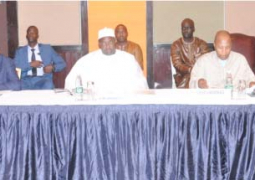In 2014, 25 per cent of the government’s hard-earned revenue went to servicing loans.
As a developing country, all the amount of revenue at the government’s disposal is inadequate to cater for the pressing needs of the country.
Notwithstanding, 31 per cent of it will be taken to pay interest on loans that were taken on behalf of the people of The Gambia.
Probably, we all must have enjoyed in one way or the other the purpose for which the loans – we are paying now – were taken.We hope the loans were used for the right purposes and used well.
We know for a fact that all developing countries take loans to finance certain activities of the government, especially capital expenditures – expenditures on financing long-term development projects like building schools, hospitals and roads.
However, every government’s ability to take loans for whatever purpose should depend on its capacity to pay without sacrificing on the altar its obligations to the people.
The loans of the Gambia government are clearly becoming a burden, for they are increasingly taking a huge chunk of the money that should be used to finance immediate pressing needs of the country.
The government will now have to always devise ways and means of generating additional revenues annually, to catch up with the ever-increasing amount to be paid on servicing the country’s loans.
One surest way a government raises more revenue is by increasing and introducing more taxes.This will mean more taxes for businesses, and employees as well will be paying more taxes.
The resultant effect of this is an increase in the cost of living and less money in the pockets of the people.This is the situation we have found ourselves in now.
There is a clear need to contain the challenging level of the government’s debt stock and steer the budget towards long-term fiscal sustainability, and support the productive base of the economy for exportation rather than relying on loans all the time.
“Restoring responsibility and accountability is essential to the economic and fiscal health of our nation.”
Carl Levin


